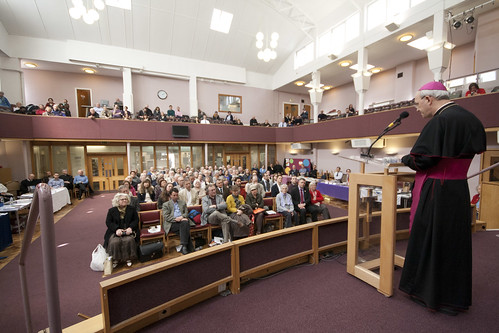
Labels
- Bishops
- Chant
- Children
- Clerical abuse
- Conservative critics of the EF
- Correctio Filialis
- FIUV Position Papers
- Fashion
- Freemasonry
- Historical and Liturgical Issues
- Islam
- Liberal critics of the EF
- Marriage & Divorce
- Masculinity
- New Age
- Patriarchy
- Pilgrimages
- Pope Francis
- Pro-Life
- Reform of the Reform
- Young people
Friday, May 30, 2014
Thursday, May 29, 2014
Basil Loftus denies the infallibility of the Ordinary Magisterium
 |
| St Vincent of Lerins |
'Where such doubt [sc. that infallibility has been invoked] does exist, infallibility
is not relevant to the argument. And it certainly exists in the case of Humanae
Vitae. How else could Cardinal Walter Kaspar have said this month: "The
Church is clearly not against birth-control at all"? Outwith the formulas
of dogmatic definitions, such as of the Assumption, it is difficult to see
where and when and how such certainty can be acquired that infallibility has
been invoked.'
As is always the case with Loftus, one falsehood is hidden inside another. One is what Cardinal Kasper actually said. Loftus is quoting a radio interview, and no one has produced a full transcript (though you can listen to the whole thing here); nevertheless the key passage is this:
It is perfectly evident that, while Cardinal Kasper did not want to be drawn into a discussion of the details of the teaching, his remark 'the Church is not against birth control' means nothing more than 'the Church does not prevent people limiting their family size: certain methods of doing this are licit'. He clearly has Natural Family Planning in mind. He doesn't want to say more. In the context of an interview that is understandable; once you get onto condoms you can never get off the subject again. Perhaps there is a hint also that there can be a gap between the Church's teaching and what people actually do, in conscience: however that is a way of avoiding a denial of Church teaching, not of making a denial of it. Whatever more complicated views Cardinal Kasper may turn out to have, Loftus' selective quotation is entirely dishonest.
The other falsehood is about the nature of infallibilty. The teaching of Humanae Vitae is infallible, not because of the authority of the document in which it is contained - an encyclical, as opposed to an ex cathedra decree - but because it reiterates the constant teaching of the Church, and the constant teaching of the Church is infallible. The Pope has the gift of picking out and clarifying the constant teaching of the Church, the 'Ordinary and Universal Magisterium', and in doing so we find passages, in encyclicals, like this.
Paul VI, Humanae Vitae 14, on abortion and contraception:
Therefore We base Our words on the first principles of a human and Christian doctrine of marriage when We are obliged once more to declare that the direct interruption of the generative process already begun and, above all, all direct abortion, even for therapeutic reasons, are to be absolutely excluded as lawful means of regulating the number of children. Equally to be condemned, as the magisterium of the Church has affirmed on many occasions, is direct sterilization, whether of the man or of the woman, whether permanent or temporary.
Similarly excluded is any action which either before, at the moment of, or after sexual intercourse, is specifically intended to prevent procreation—whether as an end or as a means.
St John Paul II, Evangelium Vitae 62, on abortion:
Given such unanimity in the doctrinal and disciplinary tradition of the Church, Paul VI was able to declare that this tradition is unchanged and unchangeable. Therefore, by the authority which Christ conferred upon Peter and his Successors, in communion with the Bishops—who on various occasions have condemned abortion and who in the aforementioned consultation, albeit dispersed throughout the world, have shown unanimous agreement concerning this doctrine—I declare that direct abortion, that is, abortion willed as an end or as a means, always constitutes a grave moral disorder, since it is the deliberate killing of an innocent human being. This doctrine is based upon the natural law and upon the written Word of God, is transmitted by the Church's Tradition and taught by the ordinary and universal Magisterium.
St John Paul II, Ordinatio Sacerdotalis 4, on the ordination of women:
Although the teaching that priestly ordination is to be reserved to men alone has been preserved by the constant and universal Tradition of the Church and firmly taught by the Magisterium in its more recent documents, at the present time in some places it is nonetheless considered still open to debate, or the Church's judgment that women are not to be admitted to ordination is considered to have a merely disciplinary force.
Wherefore, in order that all doubt may be removed regarding a matter of great importance, a matter which pertains to the Church's divine constitution itself, in virtue of my ministry of confirming the brethren (cf. Lk 22:32) I declare that the Church has no authority whatsoever to confer priestly ordination on women and that this judgment is to be definitively held by all the Church's faithful.
These are infallible statements, as St John Paul makes particularly clear, on the basis not of the Extraordinary Magisterium but the Ordinary Magisterium. Since the last of these statements continued to be contradicted on the basis that it was not clearly infallible, its status was clarified by the Congregation for the Doctrine of the Faith, under Cardinal Ratzinger, as follows.
This teaching requires definitive assent, since, founded on the written Word of God, and from the beginning constantly preserved and applied in the Tradition of the Church, it has been set forth infallibly by the ordinary and universal Magisterium (cf. Second Vatican Council, Dogmatic Constitution on the Church Lumen Gentium 25, 2). Thus, in the present circumstances, the Roman Pontiff, exercising his proper office of confirming the brethren (cf. Lk 22:32), has handed on this same teaching by a formal declaration, explicitly stating what is to be held always, everywhere, and by all, as belonging to the deposit of the faith.
What Loftus does not want his readers to understand is that it is above all the Church which is infallible. The Pope and the Councils exercise 'extraordinary' acts of infallibility from time to time, but it not necessary for them to reaffirm in this way every single thing which the Church teaches. It becomes necessary, generally speaking, only when heresy has disturbed the Faithful and the teaching is being denied, or, less often, when, as with the Immaculate Conception, the necessary connection between what was understood by all since forever and the theological consequences of that, need to be made explicit and clear to everyone. The fact that the Church has never, ever, allowed contraception, abortion, or the ordination of women, and that these things have been condemned every time they have been proposed, by every kind of council and by innumerable Popes, tells us enough. The Church has spoken. If it needs reiterating, the Pope can do so, by his special gift and duty of 'confirming the brethren', through an ordinary encyclical letter.
The idea that, unless nailed down by the Extraordinary Magisterium, no theological proposition can be regarded as beyond doubt by Catholics, is dizzying. As Loftus would be the first to point out, the number of propositions nailed down in this way is very limited, even if you include (what he ignores), the anathemas of General Councils. No: we don't have to back up every assertion that 'the Church teaches X' with a reference to the Canons of the Council of Trent or of Lateran IV. We can just say: this is the constant teaching of the Church. To deny it is to put yourself outside the Church. St Vincent of Lerins (d.445) expressed it in a way which has ever since been regarded as definitive:
Moreover, in the Catholic Church itself, all possible care must be taken, that we hold that faith which has been believed everywhere, always, by all. For that is truly and in the strictest sense Catholic, which, as the name itself and the reason of the thing declare, comprehends all universally. This rule we shall observe if we follow universality, antiquity, consent. We shall follow universality if we confess that one faith to be true, which the whole Church throughout the world confesses; antiquity, if we in no wise depart from those interpretations which it is manifest were notoriously held by our holy ancestors and fathers; consent, in like manner, if in antiquity itself we adhere to the consentient definitions and determinations of all, or at the least of almost all priests and doctors.
Wednesday, May 28, 2014
Bishop Schneider at Ramsgate
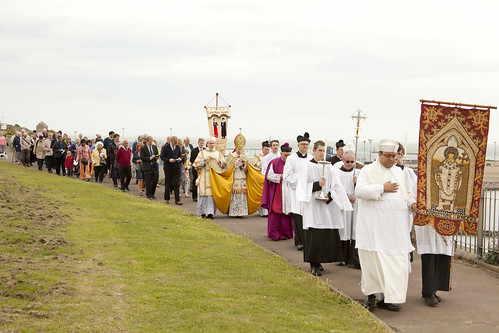
After speaking at the LMS Conference on Saturday, Bishop Schneider led another Latin Mass Society pilgrimage, to the Shrine of St Augustine of Canterbury at Ramsgate. This was the church where A.W. Pugin wanted to end his days: he built the church, and his own house right next door. It was built for the Benedictines, whose monastery is the other side of the road (a tunnel connects it with the Sacristy), but they have left. The shrine custodian is now Fr Marcus Holden, and there is an EF Mass there each Sunday.
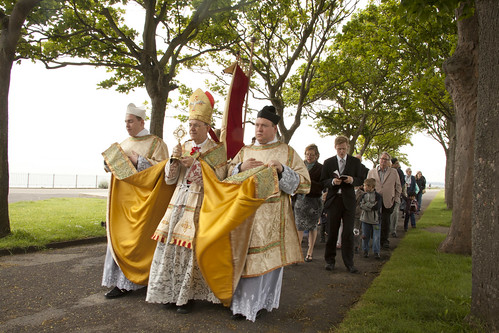
After a magnificent procession with the relic of St Augustine, Bishop Schneider celebrated Mass for a packed church.
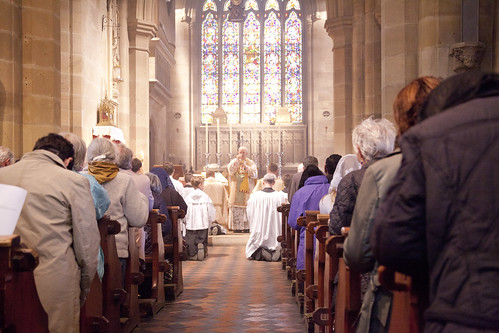
Bishop Schneider's visit has generated a fair bit of (favourable) comment; see here, for example, from Fr Ray Blake, and here from Lawrence England.
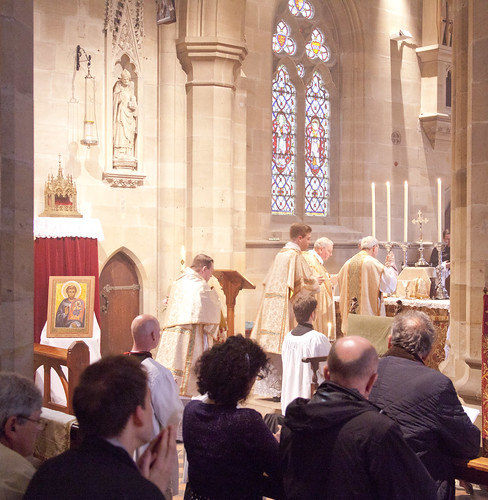
The church is magnificent, though not enormously large; heroic work has already been done by the Custodian, Fr Marcus Holden, and more is happening.
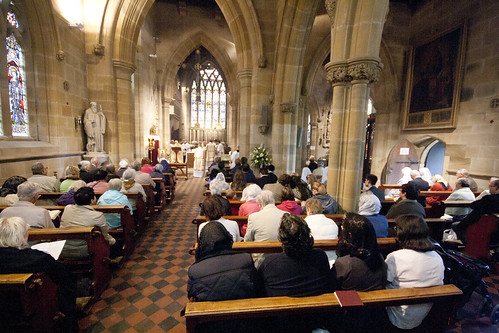
We filled the place; I and a lot of others were standing at the back.
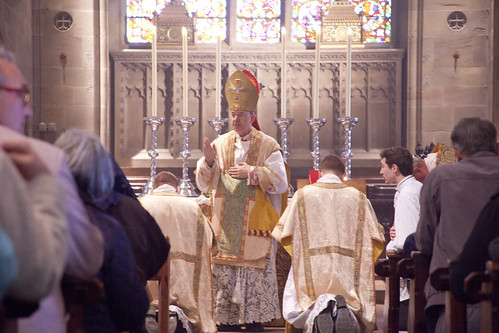
More photos.
LMS Conference: Fr Michael Mary F.SS.R

We were very honoured to have among the speakers at our Conference Fr Michael Mary F.SS.R. He is the founder and Superior of the Sons of the Most Holy Redeemer, who are based on Papa Stronsay Island in the Orkneys; they also have a very flourishing apostolate, now with an official canonical residence for their order, in Christ Church, New Zealand.
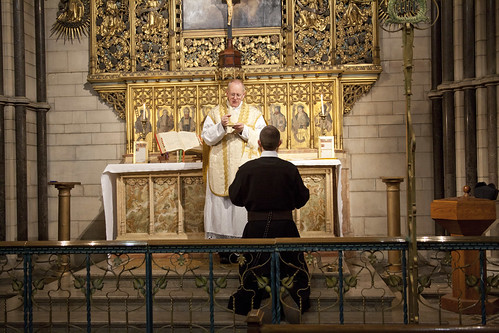
I was able to attend Fr Michael's private Mass early on Saturday, before the Conference, in the very lovely Lady Chapel of St James' Spanish Place. Another priest attending the conference, who had travelled from Poland to do so, said another Mass simultaneously on the High Altar while we were there.
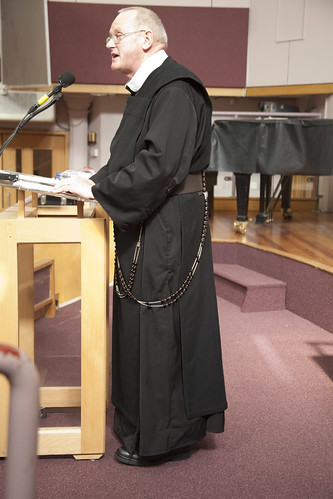
Fr Michael was the last speaker, and electrified the audience with a taste of the Redemptorist preaching tradition. I could not begin to summarise it; it will soon be available online as an MP3.
What I will say is that the Sons have agreed to give the annual Family Retreat next year, organised by the St Catherine's Trust. It will take place at the Oratory School, near Reading, from April 10-12 (Low Sunday weekend: the weekend after Easter Sunday).
Note the dates! Further details will be available closer to the time.
Tuesday, May 27, 2014
LMS Conference: Joseph Pearce
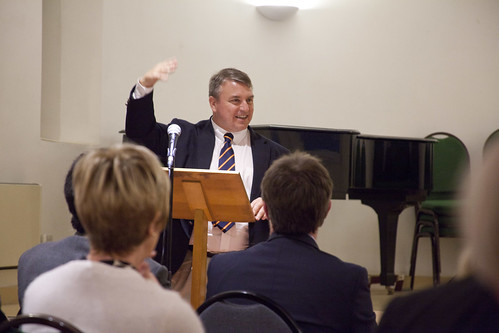
Joseph Pearce addressed the Keys, the Catholic Writers' Guild, the evening before the LMS Conference, on the subject of Aleksandr Solzhenitsyn. It is perhaps necessary today - as remarked during the course of the evening, it wouldn't have been so necessary ten or twenty years' ago - to explain that Solzenitsyn was a Soviet dissident, an army officer who spent years in the Gulag, finding not only God but his vocation as a writer.
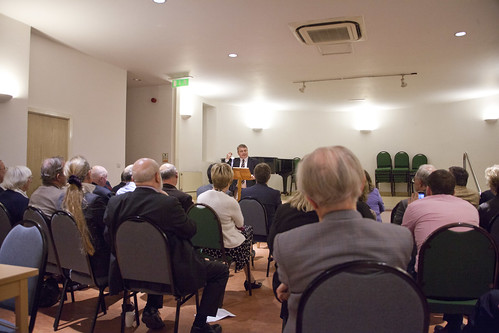
Pearce's association with Solzenitsyn was important for his own career: having emerged, after his own conversion, from far-right politics, and with one book to his name, on Chesterton, he found himself writing an authorised biography of the great man.
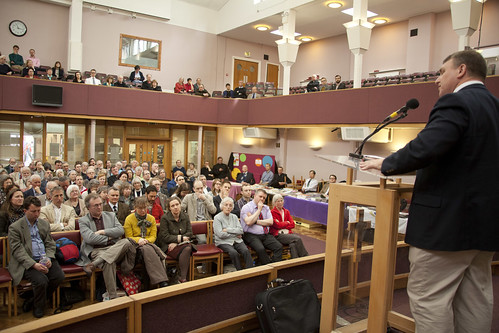
At the LMS Conference, Joseph spoke about the 'Second Spring', the Catholic revival of the late ninteenth and early 20th centuries. At the end of the talk he quoted a long series of remarks from important intellectual converts who lived to see the liturgical changes of the 1960s, who were overwhelmingly critical. You can see a discussion of their views in Joseph Pearce's important book Literary Converts, see especially pp344-360.
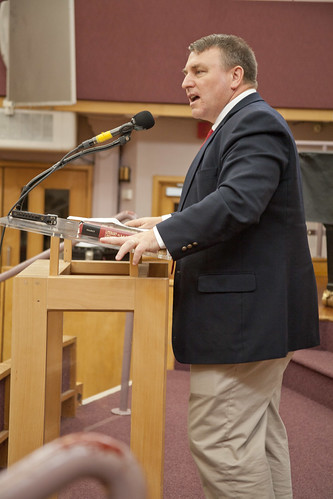
We are seeing quite a revival of interest in these 'literary converts'; early signs included the publication of Pearce's book in 1999, and some CTS booklets on some of the more important figures. Now we have especially a renewal of interest in Chesterton, even his cause for canonisation, and reprints of may of Mgr Ronald Knox's works, as well as Chesterton's. It raises the question: how was it that the Church in England was so successful in the century before the Council - and there is no illusion regarding the conversion to the Faith of these great figures, who went on to do so much for the Church they embraced - and that this success suddenly came to an end?
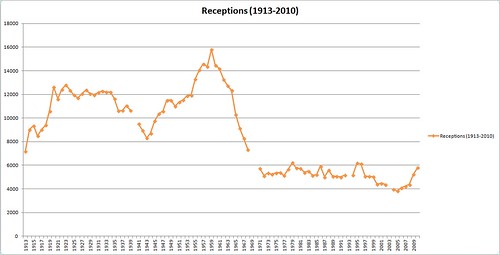 |
| Figures taken from the Catholic Directory, England and Wales only. |
It's a complex story, but something clearly went wrong. I talk more about these statistics here.
Friday, May 23, 2014
Missa Cantata in Oxford
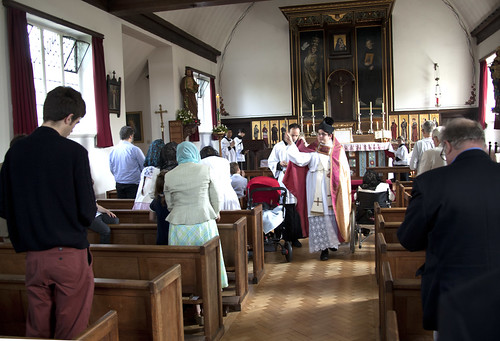
I couldn't make Bishop Schneider's Pontifical Low Mass in Reading last Sunday because I was needed to sing at our monthly EF Mass in SS Gregory & Augustine's in Oxford. That's life.
Bishop Schneider will be celebrating Pontifical Low Mass again this Sunday, in the London Oratory.
Tomorrow he and Joseph Pearce and others will be speaking at the LMS One Day Conference in London. You can get tickets on the door: details here.
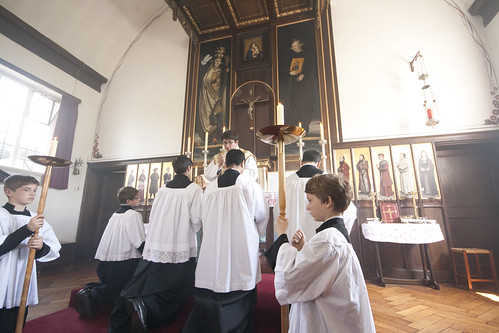
Last Sunday Mass was celebrated in SS Gregory & Augustine's by Fr Daniel Lloyd of the Ordinariate of Our Lady of Walsingham; Fr John Saward was away.
Wednesday, May 21, 2014
Bishop Schneider in Oxford
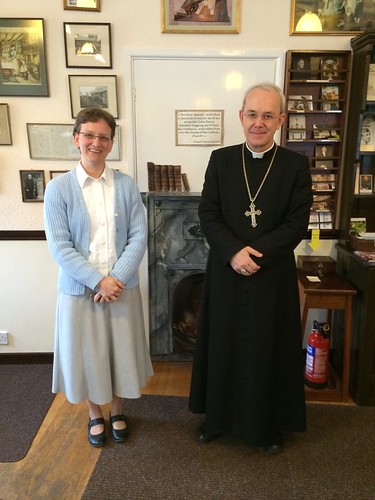 Last night Bishop Schneider address the Newman Society, on the subject of life under Communism.
Last night Bishop Schneider address the Newman Society, on the subject of life under Communism.Naturally we took the opportunity of showing him around Oxford before that, and he visited Littlemore, where Bl John Henry Newman was received into the Church by Bl Dominic Barberi.
Here Bishop Schneider is standing on the very spot where it took place, with Sr Christina of the Sisters of the Work, who look after The College, the collection of buildings Newman occupied with some of his friends, at this crucial period of his life.
The College contains many fascinating relics of Newman and Bl Dominic, including a rather touching letter Newman wrote in relation to the cause for Dominic Barberi's beatification.
His talk to the Newman Society was well attended and well received. As Bishop Schneider remarked, the terrible crimes of the Soviet period are still not widely known. I suspect the appalling sufferings of the ethnic German community, the 'Volga Germans' and the 'Black Sea Germans', at the hands of Stalin during and after the War are, I suspect, as much a closed book for most people as they were up until yesterday for me.
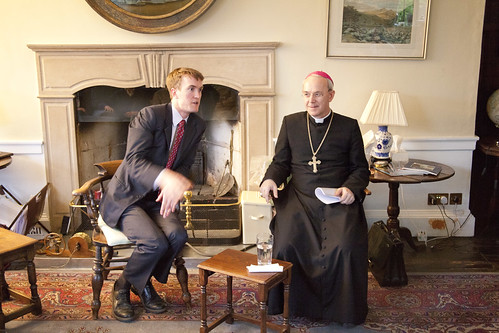
Meetings of the Newman Society generally take place in the impressive 'Blue Room' of the 'Old Bishops' Palace', in the Catholic Chaplaincy. We were joined by one of the Jesuit chaplains.
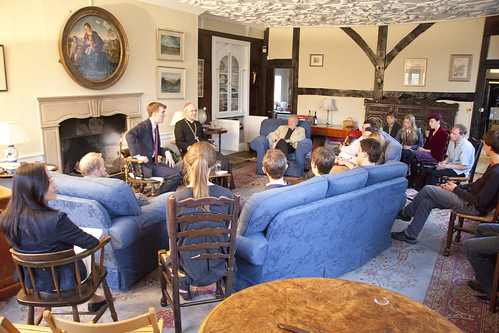
Tomorrow, on Thursday, he is addressing a parish group of the London Oratory (anyone can attend this, at 8pm), and on Saturday of course he is addressing the Latin Mass Society's One-Day Conference.
More details about the conference here.
Monday, May 19, 2014
Bishop Schneider in West Grinstead
On Saturday the LMS Pilgrimage to Our Lady of Consolation at West Grinstead, Sussex, took place, led by Bishop Athanasius Schneider.
There were about 140 people at Mass; which was followed, after a break for lunch, by a talk from Bishop Schneider and Benediction.
The Shrine of Our Lady of Consolation has long been a pilgrimage venue for the Latin Mass Society. It was the first offical Marian shrine after the Protestant Revolt, and it has the first statue of Our Lady crowned by Papal Mandate - in this case Pope Leo XIII. (The shrine images at Willesden, Caversham, and Walsingham have all also been crowned in this way.)
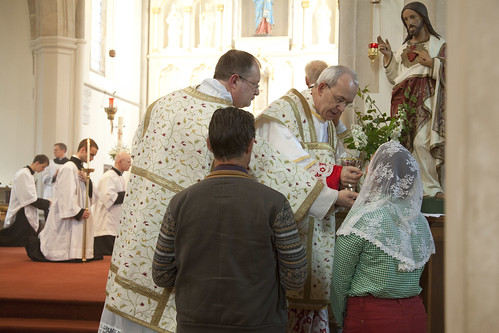
Another thing worth taking in on a visit to West Grinstead is the Rosary Walk; I have taken a set of photographs of this which you can see here. It was clearly done by the same artist as did the one at the Franciscan Retreat Centre at Pantasaph (my photos of which are here).
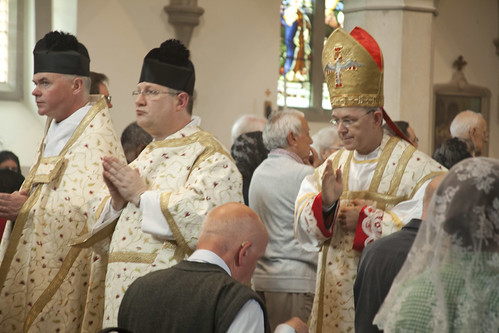
Bishop Schneider will be speaking at the LMS One Day Conference on Saturday 24th: BOOK HERE.
He will also be leading the LMS Pilgrimage to Ramsgate on Monday 26th: details here.
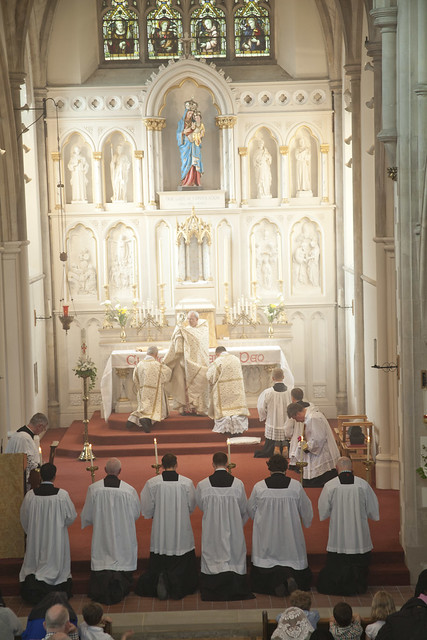
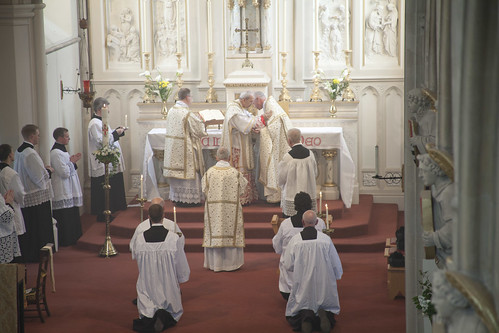 |
| The Pax: Bishop Schnieider embraces Fr Sean Finnegan, the Assistant Priest |
There were about 140 people at Mass; which was followed, after a break for lunch, by a talk from Bishop Schneider and Benediction.
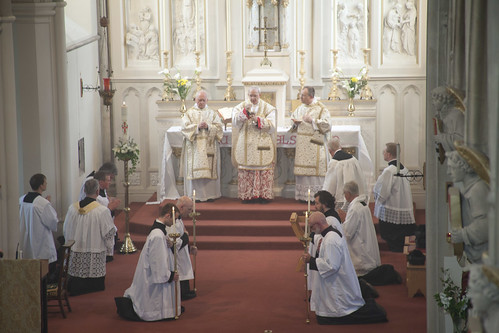 |
| Ecce Agnus Dei |

Another thing worth taking in on a visit to West Grinstead is the Rosary Walk; I have taken a set of photographs of this which you can see here. It was clearly done by the same artist as did the one at the Franciscan Retreat Centre at Pantasaph (my photos of which are here).
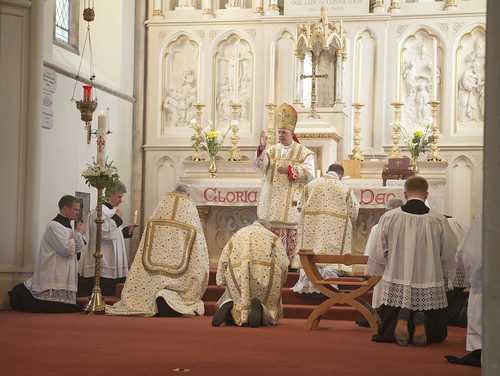 |
| Blessing at the end of Mass. |

Bishop Schneider will be speaking at the LMS One Day Conference on Saturday 24th: BOOK HERE.
He will also be leading the LMS Pilgrimage to Ramsgate on Monday 26th: details here.

Saturday, May 17, 2014
Mass of Ages: Summer edition published
The latest edition of the Latin Mass Society's quarterly magazine, Mass of Ages, has arrived on the doormats of members and is available to buy from the usual outlets, including your friendly local Represenative.
This is the first edition of a new editor, Sarah Atkinson, who has an exclusive interview with Bishop Philip Egan.
Mark Williams, the actor who plays the title role in BBC1's Father Brown series, also speaks to Mass of Ages about the challenges of the role.
We have a report from Germany on the work of Pro Missa Tridentina, our sister organisation.
We have a new column, 'At Mass With...', in which someone who has not been to a Traditional Latin Mass for many decades, or ever, tries out the Extraordinary Form and tells us about their experience of the Old Rite for the first time. First up is Timothy Whitebloom, Grammy award-winning producer.
We have a feature about the Thomas More Legal Centre and its founder barrister Neil Addison, and the first of a regular series about life in parishes where the Old Rite is regularly celebrated.
Plus all our regular features, comment and opinion pieces, our quarterly look back into the LMS archives from past decades, your letters, and a prize crossword, plus full listings of Traditional Masses across England and Wales, and much more besides.
Two taster articles are available free online.
The Sussex town of Lewes is most notorious for its Guy Fawkes Nights in which an effigy of the pope is publicly burnt to the cheers of the crowd. However, Fr Jonathan Martin, pastor of the Catholic parish of St Pancras in Lewes, speaks to Mass of Ages about a rather more edifying spectacle in the town - the regular Extraordinary Form Mass that he celebrates there and its effect on him and his parishioners.
Clash of Civilisations? Sacred sounds in a secular world
We speak to Matthew Schellhorn, professional pianist, who has just released his first CD of 'Stations' by Ian Wilson, inspired by the Stations of the Cross. When he is not touring concert venues, Matthew, who has performed on Radio 3 and Classic FM, is the LMS's Local Representative in Southwark diocese.
Friday, May 16, 2014
Young Catholic Adults retreat at Douai Abbey in September
Young Catholic Adults Weekend at Douai Abbey 2014
During the weekend of 19-21st September, YCA will be running a weekend with the assistance of the Schola Gregoriana of Cambridge there will be:-· Sung/High Masses and Marian Procession· Gregorian Chant Workshops· Rosaries, Confessions, Talks and SocialsThis is a great opportunity to deepen your faith, grow in holiness and meet fellow young Catholics – this year hear John Pridmore, Fr. Gregory Pearson and Fr. de Malleray/Fr. Goddard.
How to Book for the retreat
Please send a (NON-RETURNABLE) £10 deposit for the Cottages or a £20 deposit for the Guest House to Mrs. M Barker, 28 Wheatland Drive, Cheltenham, Glos, GL510QA.
Or use the online booking system http://bookwhen.com/yca-douai-
2014 For general enquiries please ring Damian Barker on 07908105787. For more details, please see http://www.
youngcatholicadults.co.uk/ events.htm or email margret.barker@rocketmail.com, or ring 07908105787. To donate to YCA so that it can continue and expand its apostolate please goto YCA Donation
Thursday, May 15, 2014
Position Paper on the 'silent' Low Mass: the Missa Lecta
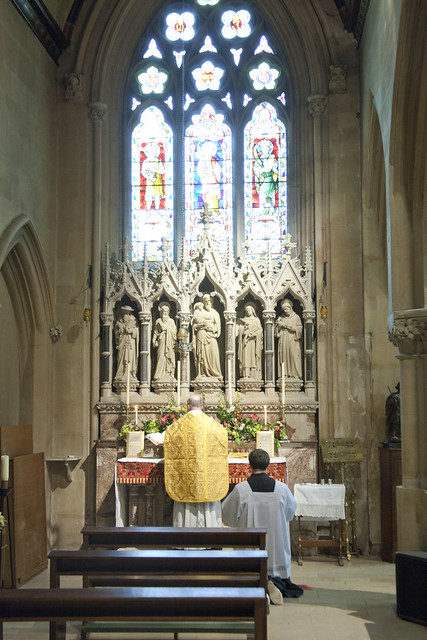 |
| Low Mass (a private Mass) said at the Belmont Priest Training Conference |
Positio 18, The Missa Lecta.
Some time ago a version of this was published in the Latin Mass Magazine in the United States.
This is the usual practice in England, the United States, and many other places, and it surprises those from certain other countries, notably France, where it is normal for the congregation to join in the responses made by the server. This latter practice is called the 'Dialogue Mass' (Missa recitata), and it was (re)introduced in the early 20th century.
The point of the paper is to show that the Missa lecta has its own rationale: you don't have to say the responses to participate in Mass. There is an obvious parallel with other issues thrown up by the liturgical debate in the course of the 20th century: the position papers have had to argue that you don't have to hear the Canon of the Mass in order to participate; you don't have to be able to see clearly what's happening on the Altar (ie have Mass 'facing the people') in order to participate; you don't have to understand all the words (ie have Mass in the vernacular) in order to participate. Catholics attended Mass with great spiritual fruit for many centuries without the aids thought so essential by 20th century liturgists.
On the historical question, it is important to bear in mind that Low Mass itself did not exist until the 9th century, so the question of saying the responses at Low Mass did not arise. The choir sings certain responses at sung Mass, and the people can join in with these, but the responses sung by the choir are not the same as those said by the servers, which are more numerous, and in a few cases lengthy. It seems that these were said by congregations at Low Mass in Southern Europe in the 16th century (and presumably before then), but there is no evidence that congregations in Northern Europe, who would have found them much more of a linguistic challenge, ever got their tongues around them.
The paper should not be seen as an attack on the Dialogue Mass: in some countries this is what happens at the Extraordinary Form at Low Mass, and it has obvious advantages. It means the Faithful become very familiar with parts of the Latin of the Mass, and engage in the action in the sanctuary in a very close way. The paper merely says that those who do not make the responses shouldn't be despised and looked down on for that reason. In any case, in whatever country you are in, in the Traditional Mass after the Offertory the responses stop, and the priest says the Canon in complete silence, broken only by the sound of the little bell signalling the consecration, and the priest's prayer of humility: nobis quoque peccatoribus. This is the real stumbling block for the theory of participation which seems to be implied by the Novus Ordo, and it simultaneously seems to be the feature of the Traditional Mass most immediately attractive to many newcomers.
Peter Kwasniewski has published a lovely meditation on the silent Low Mass here.
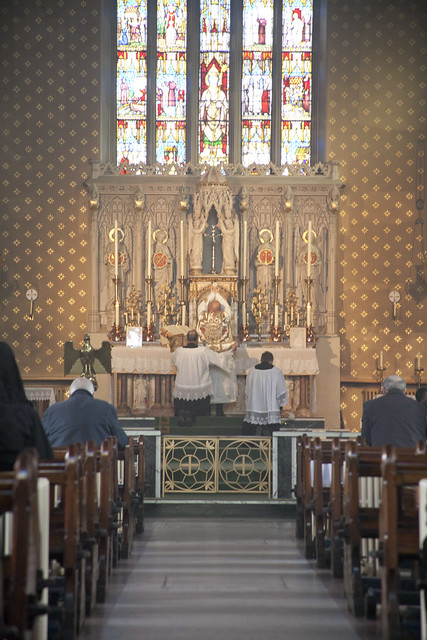 |
| Low Mass with a congregation, at St Chad's, Manchester |
Wednesday, May 14, 2014
Chant training days in London
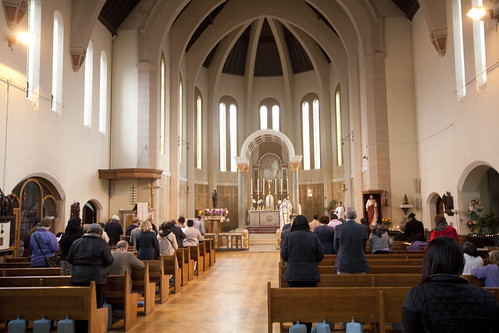 |
| Last year's Pilgrimage Mass at Our Lady of Willesden |
Two opportunities for chant training in London are being organised by the Schola Gregoriana of Cambridge.
They will take place in conjunction with special Sung Mass for two different events: the training will enable a larger group of amateurs to take part in singing for these Masses.
The Masses are the Latin Mass Society Pilgrimage to Our Lady of Willesden, in North West London, on Saturday 31st May (feast of Our Lady, Queen; Mass will be at 11am). The Shrine is at Acton Lane, Willesden, London NW10 9AX. Click for a map.
and the LMS-sponsored 'Chesterton Pilgrimage' (to seek GK Chesterton's beatification), where Mass will take place in Our Lady of Lourdes Uxbridge, Wednesday 30th July (Mass will be at 1:30). The church on the Osborn Rd (or, more simply, next to the A4020), and the post code is UB8 1UE. Click for a map.
Anyone who would like to join the Schola Gregoriana on either occasion please get in touch with the Schola Gregoriana in advance.
Numbers are limited only by the capacity of the choir gallery! And they are both a pretty large.
Email: scholacambridge@aol.com
Tel: 01223 263063
Post:
Schola Gregoriana of Cambridge,
St Benedict's,
124 Cambridge Road,
Barton,
Cambridge CB23 7AR.
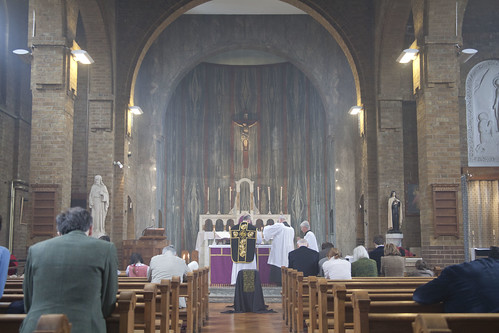 |
| A recent EF Requiem Mass at Our Lady of Lourdes, Uxbridge |
Tuesday, May 13, 2014
Mass in Milton Manor, 31st May
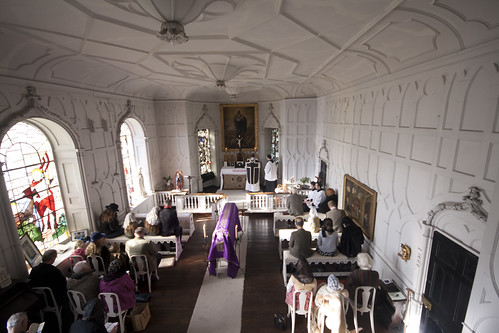
On Saturday 31st May we will be having a High Mass in the private chapel of Milton Manor House.
We have had many EF Masses there but this will be first High Mass I have organised, and that I am aware of taking place there, and we are making the extra effort to mark the 250th Anniversary of the purchase of the property by the Barrett family in 1764, who made Milton Manor a Catholic centre.
The chapel was built hidden inside the house, although not exactly a secret attic chapel it is not easy to see from outside. Catholic places of worship, and the celebration of Mass, were still illegal.
Mass will be at 11am; it will be the Feast of Our Lady, Queen.
(This is also the occasion of the LMS Pilgrimage to Our Lady of Willesden, in North West London, this year: if you can't get to Milton, you'd better get yourself there instead. Mass there is also at 11am.)
The celebrant at Milton Manor will be Fr Anthony Conlon, assisted by Fr Guy Nichols Cong Orat. & Fr Daniel Lloyd
Milton Manor is off the A34, close to Didcot and Abingdon.
(This is also the occasion of the LMS Pilgrimage to Our Lady of Willesden, in North West London, this year: if you can't get to Milton, you'd better get yourself there instead. Mass there is also at 11am.)
The celebrant at Milton Manor will be Fr Anthony Conlon, assisted by Fr Guy Nichols Cong Orat. & Fr Daniel Lloyd
Mass will be accompanied with chant and polyphony by the Schola Abelis and the Newman Consort
The chapel at Milton Manor is built in the ‘Strawbery Hill Gothic’ style of the early Gothic revival, and was consecrated by Bishop Richard Challoner in 1773. Challoner was Vicar Apostolic of the London District and the leading Catholic cleric of his day, who was a personal friend of the Barrett family and was first buried in the nearby churchyard.
We are grateful to Anthony Mockler Barrett for his hospitality in allowing us to use the chapel.
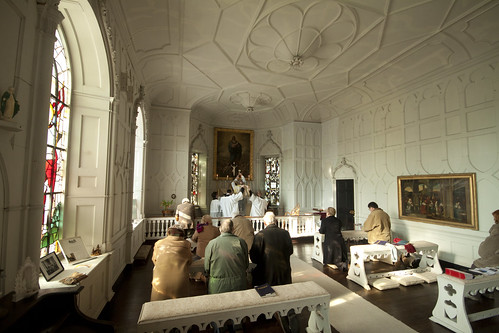
Monday, May 12, 2014
Mantillas: links
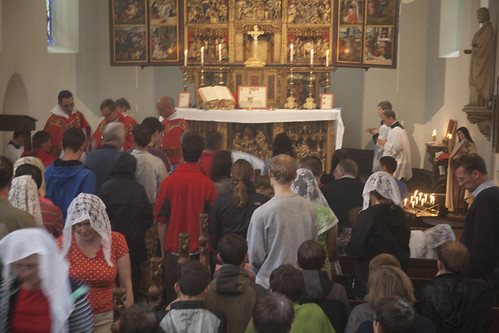 |
| Pilgrims on their way to Walsingham with the LMS Pilgrimage, at Oxburgh Hall chapel |
The issue of ladies wearing head coverings in church is one of those things which a lot of people, no doubt, expected simply to go away, if it hasn't already. It hasn't, and it isn't. There is a growing revolt by young Catholic women against the attitude that wearing a mantilla in church is freakish. This of course has commercial implications, and I've noticed that it is increasingly easy to buy them. You can, for example, get them in the CTS bookshop outside Westminster Cathedral, and online from Cenacle Books. Cenacle Books right now offers a choice of a dozen. We've come a very long way in the last ten years or so.
I've written about the rationale for mantillas here, and about the question of whether the custom would best be, in the long term, obligatory or just voluntary, here. The latter post has a rather amusing video by a young lady about the importance of mantillas.
I've written about the vitriolic opposition to mantillas by some older women here.
There's a whole blog dedicated to mantillas here - 'Loving Mantillas'.
There's a very interesting article about them here, again by a young Catholic woman. She makes the point that they can be an aid to prayer for the person wearing them, as well as helping to avoid distracting others.
Cardinal Burke makes the point that ladies covering their heads is still 'expected' in the Extraordinary Form.
There's an interesting argument, referring to treatments by a couple of neo-conservatives and lots of authoritative sources, here, that the lifting of the canonical obligation for women to cover their heads in church in the 1983 Code of Canon Law has left intact the custom, which has its own normative force. Unless the Church declares that the custom is abrogated, women are, therefore, still obliged to wear mantillas (or something else). Obviously, this argument applies just as much to the Novus Ordo.
Something else which is perhaps worth saying is that the custom was the women wore mantillas (or something) when men took off their hats. (This means 'in church', not just 'during Mass'.) One of the side-issues of the question is that the decline of hat-wearing by both sexes has made the parallel between the obligation on each sex less clear. Men don't have to take off their hats because, generally speaking, they aren't wearing them in the first place. Women can't just keep them on, for the same reason.
Here's the informative discussion on Fish Eaters.
As a matter of interest, since the English translation of the 1917 Code is not online, this is what that code's canon 1262 had to say.
1. It is desirable that, consistent with ancient discipline, women be separated from men in church.
2. Men, in a church or outside a church, while there are assisting at sacred rites, shall be bare-headed, unless the approved mores of the people or peculiar circumstances of things determine otherwise; women, however, shall have a covered head and be modestly dressed, especially when they approach the table of the Lord.
I have seen men and women sit on different sides of a church, in Tanzania. I get the impression that this hasn't been widely done in Europe for a long time, but I may be wrong.
Theee are lots of personal testimonies from women about why they like mantillas; here's new one: http://www.firstthings.com/web-exclusives/2015/02/why-i-wear-the-mantilla
Saturday, May 10, 2014
LMS One-Day Conference 24th May: running order and titles of the talks confirmed
I can now reveal the running order of our One Day Conference and the titles of the talks our speakers are giving.
The date is Saturday 24th May; the location is the Regent Hall, 275 Oxford Street, London W1C 2DJ
Click for a map: it is near the junction of Oxford Street with Regent Street, where Oxford Street tube station is.
Click for a map: it is near the junction of Oxford Street with Regent Street, where Oxford Street tube station is.
Book here: £15 for members, £20 for non-members (you can of course JOIN), optional £5 for the buffet lunch.
LMS Conference: The
Traditional Mass and Evangelisation
10:30: Doors open.
11 am: Joseph
Pearce
‘The liturgy and the Second Spring’
12 noon: Prof Thomas Pink
‘Church and state after Vatican II’
1pm: Break
for lunch
2pm: Bishop Athanasius Schneider
‘The Renewal of the liturgy according to the perennial
sense of the Church’
3pm: Christopher Hodkinson
‘Liturgy, Culture and Evangelisation’
4pm: Fr Michael Mary F.SS.R
‘The
Traditional Mass and Spirituality:
“That we may relate it in another generation” (Ps. 47:14)’
The conference ends at 5pm.
Low Mass is being celebrated round the corner in Our Lady of the Assumption, Warwick Street, at 9am, for the benefit of conference goers (and anyone else who's around), by kind permission of the Ordinariate of Our Lady of Walsingham who now run the church.
Click for a map to the church: Warwick Street runs parallel to Regent Street just south of Oxford Street. (Don't be fooled by the postal address of the church in Golden Square, the entrance is in Warwick Street.)
You can get tickets on the door - but you won't be able to get the buffet lunch.
Book your ticket for the conference here.
Friday, May 09, 2014
Video: LMS Pilgrimage to York
Kasper, heroism, and obligations
 |
| Bl Franz Jägerstätter, executed by the Nazis for
refusing to fight an unjust war.
|
To live together as brother and sister? Of course I have high respect for those who are doing this. But it’s a heroic act, and heroism is not for the average Christian. That could also create new tensions. Adultery is not only wrong sexual behavior. It’s to leave a familiaris consortio, a communion, and to establish a new one. But normally it’s also the sexual relations in such a communion, so I can’t say whether it’s ongoing adultery. Therefore I would say, yes, absolution is possible. Mercy means God gives to everybody who converts and repents a new chance.
As I remarked in that post, there are two things going on here.
In the second half, there is a finessing of the idea of adultery: it stops being adultery when there is no longer an original marriage to which to be unfaithful. This seems to be the basis of the idea that the adulterous person can repent, as of a sin firmly in the past, connected with the first marriage which cannot now be revived. But obviously it is still sex outside marriage to I'm not sure what difference that makes.
Can we just agree on this? That the law of God, expressed in the Sixth Commandment, forbids sex outside marriage. This moral norm has no exceptions. Sex (genital sexual acts) outside marriage is intrinsically evil: per se malum. Or, as the Catechism expresses it (2391)
Carnal union is morally legitimate only when a definitive community of life between a man and woman has been established.
Can we just agree on this? That the law of God, expressed in the Sixth Commandment, forbids sex outside marriage. This moral norm has no exceptions. Sex (genital sexual acts) outside marriage is intrinsically evil: per se malum. Or, as the Catechism expresses it (2391)
Carnal union is morally legitimate only when a definitive community of life between a man and woman has been established.
The first half of the Kasper quotation is equally strange. The suggestion appears to be that moral obligations which are difficult - it is tempting to assume he means 'impossible', but no, he is clear he just means 'difficult', 'heroic'; some people actually fulfill them - don't bind in conscience. Ordinary Christians don't have to worry about them.
A related, but in a sense opposite, view, is that there are moral obligations which are impossibly difficult and that we stand condemned for failing to accomplish them. This is the view of Classical Protestantism, you find it in Luther and Calvin and modern followers such as Karl Barth. But perhaps it is not such a different view, because what they say next is that God lets us into heaven despite these failings, to which every human being, apart from Christ, is subject all the time. So it rather comes to the same thing: demanding moral precepts cease to be action-guiding, they remain as vague ideals, we break them and we're somehow ok all the same.
Canon 17. If anyone says that the grace of justification is shared by those only who are predestined to life, but that all others who are called are called indeed but receive not grace, as if they are by divine power predestined to evil, let him be anathema.
Canon 18. If anyone says that the commandments of God are, even for one that is justified and constituted in grace, impossible to observe, let him be anathema.
The main text of the decree:
CHAPTER XI: THE OBSERVANCE OF THE COMMANDMENTS AND THE NECESSITY AND POSSIBILITY THEREOF
But no one, however much justified, should consider himself exempt from the observance of the commandments; no one should use that rash statement, once forbidden by the Fathers under anathema, that the observance of the commandments of God is impossible for one that is justified. For God does not command impossibilities, but by commanding admonishes thee to do what thou canst and to pray for what thou canst not, and aids thee that thou mayest be able. His commandments are not heavy, and his yoke is sweet and burden light. For they who are the sons of God love Christ, but they who love Him, keep His commandments, as He Himself testifies; which, indeed, with the divine help they can do.
Apart from Protestantism, I hear another echo in Kasper's argumentation. It is with the idea popular in Germany after the War that when ordinary Germans collaborated with the terrible crimes of the Nazis they should not really be blamed. It would be too much to ask that they oppose those crimes. Heroes opposed them, yes, and were mercilessly killed. You can't expect that of ordinary people.

Well, we don't expect it - as a matter of prediction. But God demands it. Just as He demands that we refuse to apostasise under persecution, or refuse to sacrifice our platoon by running away from the advancing enemy in battle. Yes, there is such a thing as the destruction of a person's will and personality by torture, or terror making it impossible to move, but we are not talking about that sort of case. We may be called on to risk our lives, we may be called on to risk our livelihoods, we may be called on to risk the relationships which, we think, give meaning to our lives. It doesn't happen frequently but it happens often enough. If we fail we may be lucky and get the chance to repent afterwards. But then again we may not.
But when God demands these things of us, He also supplies the grace to enable us to do them. And that is why you find the most unlikely people, in the Catholic tradition, doing the most remarkable things. You don't have to be strong, you don't have to be full of worldly wisdom, you just have to be open to grace. God chooses the weak.
Thursday, May 08, 2014
LMS Pilgrimage in honour of St Chad, 17th May
For the first time, the Latin Mass Society is organising a pilgrimage to the Shrine of St Chad, which is in the Cathedral - St Chad's - of the Archdiocese of Birmingham. His relics were preserved at the Reformation and are housed there.
It takes place at St Chad's Cathedral, Birmingham, St Chads Queensway, Birmingham B4 6EU, on 17th May 2014.
Mass will be said 12 noon; bring your own lunch, which will be followed by devotions finishing with Benediction at 3pm.
Click for a map.
It takes place at St Chad's Cathedral, Birmingham, St Chads Queensway, Birmingham B4 6EU, on 17th May 2014.
Mass will be said 12 noon; bring your own lunch, which will be followed by devotions finishing with Benediction at 3pm.
Click for a map.
St Chad was, after various adventures, the apostle of Mercia, the Saxon ancient kingdom of the Midlands, stretching from East Anglia to the Welsh border which gave it its name. He established his episcopal see at Lichfield. He has two feast days: on 2nd March, and the Translation of his Relics, which falls on the Tuesday of the 4th Week after Easter - only in the Extraordinary Form, and only in the Archdiocese of Birmingham. It is this feast which we are marking, on the nearest Saturday.
This year annoyingly it clashes with the LMS Pilgrimage to West Grinstead, where Mass will be celebrated by Bishop Athanasius Schneider. Readers in England will have to choose which one to attend!
St Chad's Cathedral is very much worth a visit: it is one of only two minor basilicas in England, the other being Downside Abbey. It was designed by A.W. Pugin and consecrated in 1841.
Cardinal Kasper replies to his critics

I blogged some time ago about the talk Cardinal Kasper gave to the Cardinals in Rome on the subject of giving Communion to those remarried after divorce (when the first marriage was valid and the spouse still living). There were a number of aspects of what he said which seemed unclear.
In a new interview the interviewer puts to Cardinal Kasper some of the points made about his talk, and Kasper responds. So this is quite interesting.
Thus, Kasper was asked exactly what sort of situation he had in mind when he suggested that, without leaving an adulterous relationship, a Catholic might be encouraged to return to Communion.
The failure of a first marriage is not only related to bad sexual behavior. It can come from a failure to realize what was promised before God and before the other partner and the church. Therefore, it failed; there were shortcomings. This has to be confessed. But I cannot think of a situation in which a human being has fallen into a gap and there is no way out. Often he cannot return to the first marriage. If this is possible, there should be a reconciliation, but often that’s not possible.
The first half seems to be about invalid marriages: a 'failure to realise what was promised'. Later he says that the Holy Father remarked (off the cuff, it appears) that perhaps 50% of marriages in the Church were invalid.
The second half seems to be about marriages which cannot be 'repented' in this way. What then? Kaspar's concern is that the people do not 'fall into a gap': a gap in the moral law, an insoluble dilemma. The dilemma is, according to Kasper, that the option demanded by the Natural Law, that illicit sexual relations cease, is 'impossible'.
To live together as brother and sister? Of course I have high respect for those who are doing this. But it’s a heroic act, and heroism is not for the average Christian. That could also create new tensions. Adultery is not only wrong sexual behavior. It’s to leave a familiaris consortio, a communion, and to establish a new one. But normally it’s also the sexual relations in such a communion, so I can’t say whether it’s ongoing adultery. Therefore I would say, yes, absolution is possible. Mercy means God gives to everybody who converts and repents a new chance.
The second marriage, of course, is not a marriage in our Christian sense. And I would be against celebrating it in church. But there are elements of a marriage. I would compare this to the way the Catholic Church views other churches. The Catholic Church is the true church of Christ, but there are other churches that have elements of the true church, and we recognize those elements. In a similar way, we can say, the true marriage is the sacramental marriage. And the second is not a marriage in the same sense, but there are elements of it—the partners take care of one another, they are exclusively bound to one another, there is an intention of permanence, they care of children, they lead a life of prayer, and so on. It’s not the best situation. It’s the best possible situation. Realistically, we should respect such situations, as we do with Protestants. We recognize them as Christians. We pray with them.
In a new interview the interviewer puts to Cardinal Kasper some of the points made about his talk, and Kasper responds. So this is quite interesting.
Thus, Kasper was asked exactly what sort of situation he had in mind when he suggested that, without leaving an adulterous relationship, a Catholic might be encouraged to return to Communion.
The failure of a first marriage is not only related to bad sexual behavior. It can come from a failure to realize what was promised before God and before the other partner and the church. Therefore, it failed; there were shortcomings. This has to be confessed. But I cannot think of a situation in which a human being has fallen into a gap and there is no way out. Often he cannot return to the first marriage. If this is possible, there should be a reconciliation, but often that’s not possible.
The first half seems to be about invalid marriages: a 'failure to realise what was promised'. Later he says that the Holy Father remarked (off the cuff, it appears) that perhaps 50% of marriages in the Church were invalid.
The second half seems to be about marriages which cannot be 'repented' in this way. What then? Kaspar's concern is that the people do not 'fall into a gap': a gap in the moral law, an insoluble dilemma. The dilemma is, according to Kasper, that the option demanded by the Natural Law, that illicit sexual relations cease, is 'impossible'.
It is important to note here that Kasper appears to be saying that fulfilling the Natural Law is (psychologically?) impossible for most people (the 'average' Christian). But this doesn't leave them in an impossible dilemma - it frees them from it. Because he also appears to accept the principle that 'ought implies can'.
Note also the interesting suggestion that once the original marriage has broken up, adultery ceases, because one can no longer describe the illicit sexual relations with the new partner as infidelity to an on-going 'communio' with the spouse. At least I think that's what he's saying. And that gives us a chance to talk about a return to some form of moral life.
The interviewer asks: So, just to be clear, when you talk a divorced and remarried Catholic not being able to fulfill the rigorist’s requirements without incurring a new guilt, what would he or she be guilty of?
Kasper: The breakup of the second family. If there are children you cannot do it. If you’re engaged to a new partner, you’ve given your word, and so it’s not possible.
Kasper: The breakup of the second family. If there are children you cannot do it. If you’re engaged to a new partner, you’ve given your word, and so it’s not possible.
So what is, morally speaking, possible?
To summarise the position, as I understand it, the suggestion is that, since
(a) it would be sinful for the partners of the new relationship to split up, because of the children and their obligations to each other, and
(b) it is impossible for them ('average Christians') to live together without sexual relations, but
(c) there must be a psychologically possible moral solution for them.
It then just follows, logically, that
(d) living together in the second relationship and having sexual relations must be morally permissible.
The only thing which they need to repent of, then, is the failure of the first marriage, which includes the sexual infidelity to an existing relationship (if that's how the story went).
And we have to come up with an account of sexual relationships outside marriage which are permissible, as Kasper does. A stable quasi-marital relationship which is not marriage has a name: it is called concubinage. What this comes to is the acceptance of concubinage.
At a certain point in the interview Kaspar suggests that St Alphonsus Ligouri and St Thomas Aquinas would agree with him. I, respectfully, doubt that.
I agree with point (c): people always have a moral way out. Kasper's argument depends therefore on creating an apparent dilemma which will justify the astonishing solution of rejecting the Sixth Commandment. This is created by points (a) and (b), both of which look very dubious. (b) of course is the rejection of what is supposed to be a pastoral solution to the problem created by (a), the traditional approach would be to say that the couple should separate. If (b) is indeed impossible we are thrown back on that. So what's wrong with separation?
It would cause harm to the children and to the spouse: this is true, but this is simply the consequence of earlier sins. We can't always avoid such consequences, and the possibility of them arising does not constitute an impossible moral dilemma. It is easy to think of examples. It is not a sin, for example, to reveal to one's spouse some evil about one's past which one should have revealed before marriage. It is not a sin to take children away from an expensive school because one has gambled away all one's money. It is not a sin to confess one's crimes in court and go to prison justly for them, leaving one's family bereft of one's love and support.
Sometimes one has to live with one's past.
Tuesday, May 06, 2014
Bishop Davies Confirms and Celebrates Mass in SS Peter & Paul, New Brighton
I've been sent these photographs of Bishop Mark Davies conferring the Sacrament of Confirmation at SS Peter & Paul in New Brighton (in the Wirral), and celebrating Mass there (on the same occasion).
This is the first time Bishop Davies has celebrated Mass in the Extraordinary Form in public.
The Latin Mass Society's Pilgrimage to the Shrine Church of SS Peter & Paul & Philomena will take place on Saturday 2nd August.
Confirmations in the Extraordinary Form for people from all over the country will take place in London on Saturday 15th November - date to be confirmed - in St James' Spanish Place. Get in touch with the LMS Office if you want your children confirmed or need to be confirmed yourself: details here.
Monday, May 05, 2014
Priest Training at Belmont Abbey

As promised, here are some pictures of the Priest Training Conference which took place last week at Belmont Abbey, organised by the Latin Mass Society.
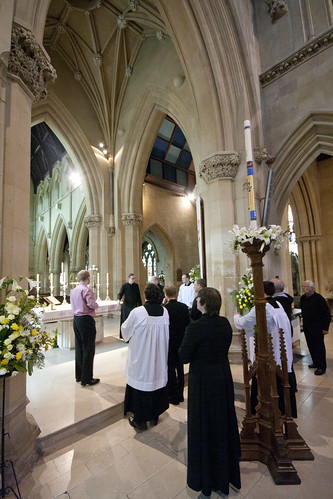
Not for us carping from the sidelines about the state of the Church. We are actually doing something about it: priests and deacons, actual and in training, who wish to learn how to say the Traditional Mass, and to perform the various functions of High Mass, and servers and Masters of Ceremonies, are all welcome at our training conferences are hugely subsidised rates. Seminarians, in fact were free this year. There couldn't be a more concrete contribution to the liturgical, and therefore spiritual, renewal of the Catholic Church in England and Wales.
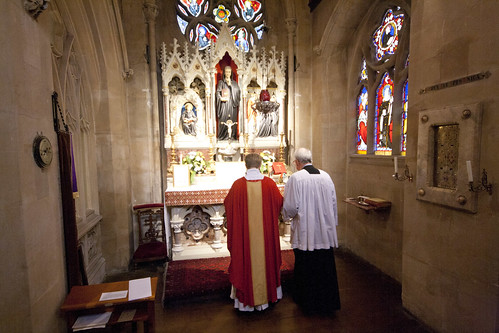
This year's conference has been the most successful for many years - perhaps ever. The venue is lovely, and we overflowed the onsite accommodation and were booking up nearby B&Bs. Numbers were up on recent years.
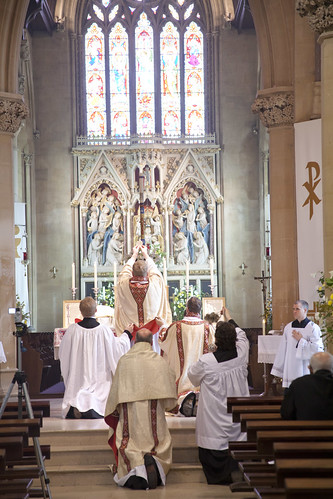
We had a good mix of old and new faces, diocesan clergy, including two from Scotland, members of the Ordinariate, a permanent deacon or two, a seminarian, and a variety of servers at different stages. I was there for two days, and saw two lovely High Masses, two Vespers, including a 'three cope' Solemn Vespers for St Joseph the Worker, Benediction, and lots of private Masses and training sessions.

In the past few years it has been Clifton Diocese which has sent the most people; this year it was the turn of Plymouth Diocese.
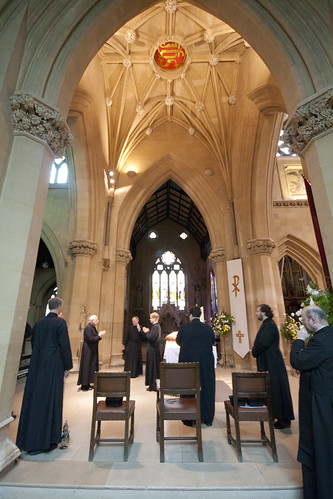
Many priests learn the ancient Mass in whole or in part in one-to-one sessions with a friendly local priest who knows it. This may be the only practical way, but it does have its limitations: not only those of the local priest himself, but of the nature of one-to-one tuition: it is simply impossible to see or practice the ceremonies of a High Mass, involving celebrant, deacon and subdeacon, plus MC and servers, with only two people.
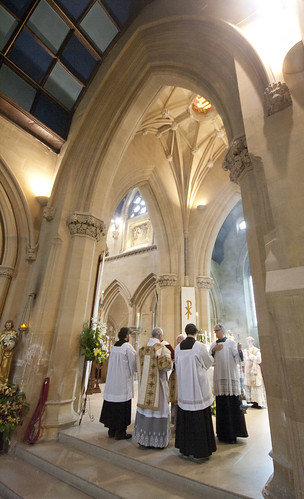
As well as having some very experienced priests to teach the clergy, we have a number of excellent MCs and singers. For part of the week Fr Guy Nichols Cong Orat, the founder of the Newman Institute of Sacred Music, was on hand.
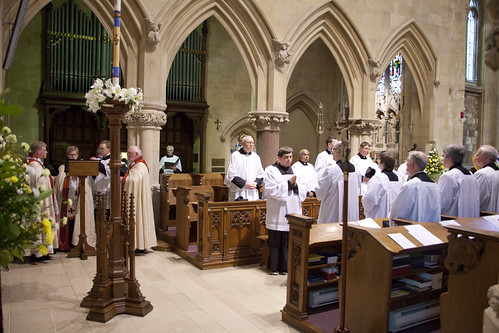
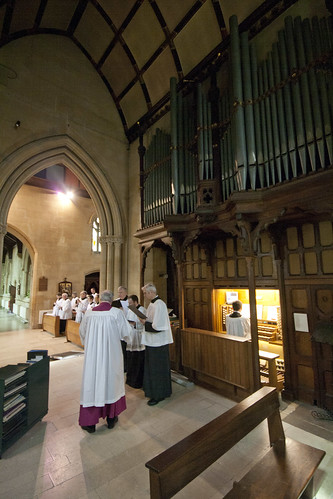
Our services were accompanied by the Rudgate Singers under Mike Forbester, with Christian Spence playing the organ.
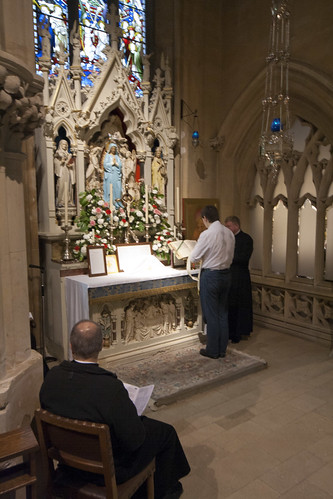
These conferences are a very important opportunity for clergy to meet like-minded people, and the round of services gives it something of the character of a retreat.
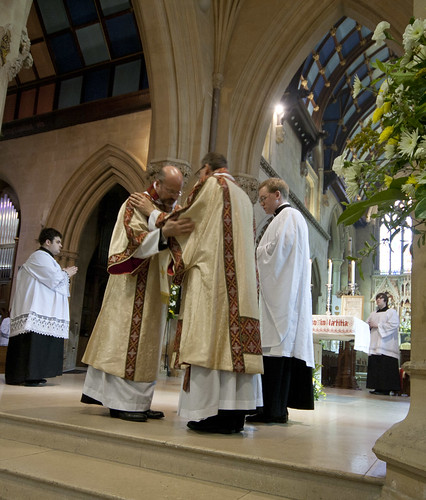
For me, as I'm sure for others, the chance to get to know one of England's really superb neo-Gothic masterpieces, Belmont Abbey, was also very welcome. The stunning Abbey Church was designed by Edward Pugin and consecrated in 1860.
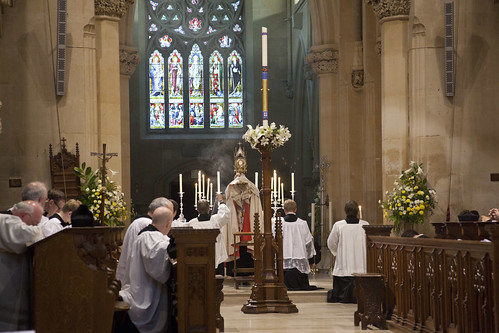
It has survived the 'changes' pretty well, although the high Altar was, sadly, destroyed at an early stage. One of the things which I particularly admired was the stained glass windows, produced by Hardman, the firm which usually collaborated with the Pugins. They show a lot of English martyrs, and other English saints, including many I have not seen depicted before.
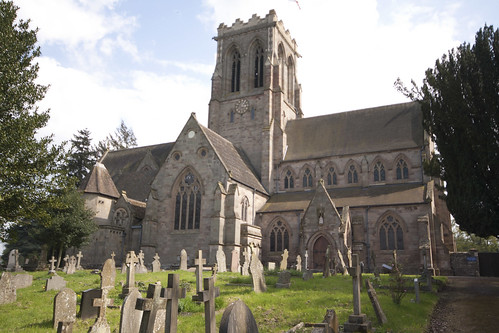
The full set of my photos is here; I have created subsets for the art and architecture, and for the training sessions and private Masses.
Subscribe to:
Comments (Atom)






